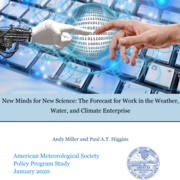Executive Summary
Work helps define our lives and the society we live in. The workforce is undergoing a period of rapid change due to a wide range of technological and societal shifts. These drivers of change will touch virtually every professional field and individual career throughout the world over the next 1–3 decades. This AMS Policy Program study examines workforce influences and needs for the weather, water and climate enterprise.
Four issues are central to advancing the weather, water, and climate workforce: 1) to understand the overarching social and technological factors that create opportunities and challenges for workforce development broadly; 2) to recognize the specific issues that relate to Earth system science, observation, and service (ESSOS) in particular; 3) to examine options within and beyond the enterprise for workforce advancement in weather, water, and climate (WWC) (including the role of AMS, K–12 education, professional development, and the policy process); and 4) to characterize remaining needs that, if addressed, could build workforce capacity.
Rapid technological advancement is affecting worker productivity and the skills employees need. We focus on four technological drivers: 1) artificial intelligence (AI), 2) new and nontraditional datasets, which contribute to Big Data techniques, 3) new forms of large-scale computing and collaborations across large distances, which are made possible by cloud computing, and 4) transformed access to information and new forms of communication, which are enabled by a new media landscape including mobile apps and social media.
Societal changes are altering the context in which businesses operate, the motivations of workers, and career opportunities for people throughout their lives. We emphasize four societal drivers: 1) growing recognition of the importance of diversity, equity, and inclusion (DEI) in scientific advancement and the application of science for societal benefit, 2) increasing demand for science to directly benefit the broader society, 3) the wide-ranging consequences of globalization, and 4) shifting roles and responsibilities among the public, private, academic, and NGO communities.
These technological and societal drivers are often interconnected and sometimes indistinguishable (i.e., technological changes drive societal change and vice versa). They also occur during a time of demographic changes in the US such as generational shifts and the increasing ethnic diversification of the American workforce.
The weather, water, and climate community is subject to these drivers and also has several distinct characteristics that influence workforce needs and opportunities. Most notably, public-private-academic-NGO partnerships are relatively advanced within the enterprise; the linkages among observations, science, and service are particularly strong; WWC science is highly interdisciplinary; and enterprise work connects directly to people’s daily lives and future prospects.
Here we identify eight opportunities and needs for workforce advancement. The weather, water, and climate enterprise should:
- Build adaptiveness: to recognize and harness opportunities, and build resilience to face the challenges embedded in social change and technological advances, ranging from new media, to more flexible computing, and the internet of things.
- Promote holistic approaches to Big Data and artificial intelligence (AI) that simultaneously consider issues of data quality, sharing, privacy, access, and bias.
- Develop a diverse and inclusive culture; one that welcomes people from all backgrounds, empowers individual contributions, and encourages all to share their talents fully.
- Enhance purpose-driven science that provides societal benefit. This will advance public wellbeing and create fulfilling career pathways for prospective members of the workforce.
- Enable and promote phased retirement and succession planning.
- Strengthen adaptive and evidence-based approaches to teaching and worker training.
- Encourage development of high-value but nontraditional skills including collaboration and communication.
- Facilitate collaboration across sectors, particularly in the education of students and workforce training.
Education will help determine the foundational skills and capabilities of the future workforce and how broadly distributed those capabilities are among the population. Policy choices will support or hinder workforce advancement by providing and directing resources; creating incentives to encourage (discourage) constructive (harmful) behaviors and practices; regulating behaviors; or encouraging challenging discussions associated with new technologies and societal developments.
As a result, progress in weather, water, and climate will depend on individual choices, community efforts, and societal decisions. Furthermore, efforts will be broadly distributed among the public, private, academic, and NGO communities. These must be considered both separately and together to promote maximum effectiveness.
AMS is engaged in a number of follow-on activities to understand workforce challenges and opportunities to help to meet future needs. For example, the newly formed AMS Department of Career Development strives to create resources to expand opportunity and support professional development across a wide range of traditional and nontraditional paths throughout one’s career.
